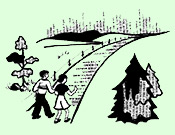
By Lois E. Wilson
“That’s nonsense!” Have you had this conclusion uttered to you, someone else, or a situation?
“Nonsense” is defined in Oxford Languages:
“Spoken or written words that have no meaning or make no sense: Foolish or unacceptable behavior. A few of its many synonyms are balderdash, gibberish, blarney, rubbish, and hogwash.”
Maybe you were attending a meeting, had a salesperson giving you a hard-sell spiel, or heard a politician spouting off nonexistent accomplishments. Would you think to yourself, “That‘s nonsense!”
Nonsense may be done with a humorous intent or to actually deceive and put one on the wrong path. It can be harmful, create misconceptions and injury. It can result in a no-win situation for its target.
“True wisdom knows it must comprise some nonsense as a compromise, lest fools should fail to find it wise.” (Piet Hein–Grooks)
I wrote this verse titled “The Search” in 2012. It proposes part of the problem when it comes to common sense:
“When scholars studied “common sense” and looked at all the evidence,
They learned the sense that some dispense is offense with its own expense.
Scholars found “common sense” is rare. They didn’t find it everywhere.
It’s scattered among the many; but sadly not all have any.”
To summarize, common sense relies on us using all the information available on a subject or activity before us. We should weigh events and situations; be suspicious.
We should pause and question, “Is this too good to be true? Is this common sense or nonsense?” Then your response is more likely to be accurate and result in a thoughtful and beneficial answer.

